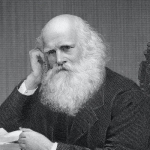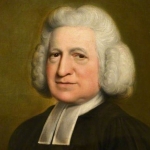Good and great god, can I not think of thee
But it must straight my melancholy be?
Is it interpreted in me disease
That, laden with my sins, I seek for ease?
Oh be thou witness, that the reins dost know
And hearts of all, if I be sad for show,
And judge me after; if I dare pretend
To ought but grace or aim at other end.
As thou art all, so be thou all to me,
First, midst, and last, converted one, and three;
My judge, my witness, and my advocate.
Where have I been this while exil'd from thee?
And whither rap'd, now thou but stoop'st to me?
Dwell, dwell here still. O, being everywhere,
How can I doubt to find thee ever here?
I know my state, both full of shame and scorn,
Conceiv'd in sin, and unto labour borne,
Standing with fear, and must with horror fall,
And destin'd unto judgment, after all.
I feel my griefs too, and there scarce is ground
Upon my flesh t' inflict another wound.
Yet dare I not complain, or wish for death
With holy Paul, lest it be thought the breath
Of discontent; or that these prayers be
For weariness of life, not love of thee.



















Comment form: